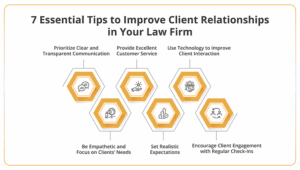Clients today expect more than solid legal advice—they want to feel heard, respected, and informed. This article shares seven practical strategies to strengthen your client relationships and build a trusted, thriving law practice.
Why Your Law Firm Must Prioritize Client Relationships
Here is why your law firm needs to have strong client relationships.
1. Client Retention
When clients feel valued and understood, they are more likely to return to your firm for future legal needs. They are also less likely to shop around for another lawyer. Retaining clients is often more cost-effective than constantly finding new ones.
2. Increased Client Satisfaction
Satisfied clients are your best promoters. When you develop strong relationships with them, they’re more likely to recommend your services to friends, family, and colleagues. Referrals from trusted sources can be more valuable than any advertisement. The more clients trust you, the more likely they will spread the word about your firm.
When clients feel treated with respect and care, their overall satisfaction increases. High client satisfaction can lead to repeat business, positive reviews, and greater loyalty. Satisfied clients are also more likely to give you constructive feedback, helping you improve your services.
3. Improved Legal Outcomes
When clients trust you, they are more likely to fully cooperate and follow your advice. This can lead to better legal outcomes. Clients who are engaged and willing to collaborate make your job easier and your legal strategy more effective.
4. Long-Term Success
Ultimately, having strong client relationships contributes to the long-term success of your law firm. Repeat clients, referrals, and a positive reputation contribute to sustained growth and profitability. Building lasting relationships is an investment that pays off both financially and reputationally.
7 Essential Tips to Improve Client Relationships in Your Law Firm

Strong client relationships are the foundation of any successful law firm. Here are seven essential tips to help you build trust, loyalty, and long-term success with your clients.
1. Prioritize Clear and Transparent Communication
Clients rely on you to guide them through the legal process, and they need to understand what’s happening every step of the way. When they are unsure about the next steps, costs, or how long things will take, it creates anxiety and frustration. This can lead to misunderstandings and damage the trust you’ve worked hard to build.
By communicating openly, you set clear expectations and keep clients informed, which helps them feel confident and reassured. They will know what to expect, which can make a big difference in how they experience the legal process. Here is how you can do this:
- Regular Updates: Keep clients in the loop, even without major news. Let them know where things stand, what you’re working on, and any upcoming milestones. This helps avoid surprises and shows them you’re on top of their case.
- Avoid Legal Jargon: Legal terms can be confusing. Use simple, everyday language to explain processes, terms, and options. Clients who understand what’s happening feel more involved and confident in your expertise.
- Be Responsive: Time matters. Respond to client inquiries as quickly as possible, ideally within 24 hours. If you need more time to gather information or give a detailed response, let them know when they can expect a full reply. Being prompt and reliable shows respect for their time and needs.
When you communicate clearly and frequently, clients feel more valued. The more they trust you, the more likely they will stay loyal and recommend your services to others.
2. Be Empathetic and Focus on Clients’ Needs
Legal issues can be overwhelming for clients. Whether they are going through a divorce, facing criminal charges, or dealing with a personal injury, the stress and uncertainty can take a toll on them.
These situations often have life-changing consequences, and clients need more than just legal advice; they need to feel heard and understood. By acknowledging their struggles, you create a deeper level of trust and comfort, which can help them feel more at ease working with you. You can be empathetic towards them by:
- Listen Actively: Don’t just hear what your clients say; take the time to listen. Give them space to share their concerns and feelings without interrupting.
- Acknowledge Their Emotions: Clients are often going through difficult times. Simple phrases like, I understand this must be a tough time for you, can make a big difference.
- Personalized Interaction: Treat each client as an individual, not just a case number. Use their name and tailor your communication to fit their unique situation. Understanding their specific needs and concerns shows you value them as people, not just clients.
When clients feel understood and supported, it creates a strong emotional bond. This emotional connection can significantly impact their overall experience with you.
3. Provide Excellent Customer Service
The client relationship doesn’t stop once their case is resolved. Many law firms make the mistake of thinking their work ends there.
Offering value after the case strengthens clients’ trust and loyalty toward your firm. It shows your commitment to their long-term needs, not just short-term legal issues. You can accomplish this by implementing the following strategies:
- Follow-Up Post Case Resolution: Don’t let your relationship end when the case does. Check in with your clients after the case has closed to see how they’re doing. This can be as simple as an email or a brief phone call. Ask if they need help with anything else or if any legal issues come up.
- Client Satisfaction Surveys: Send surveys to gather feedback on your service. Asking clients how they felt about the process and where you could improve shows that you’re committed to improving.
This leads to more satisfied clients who are more likely to return to your firm for future needs and recommend your services to others.
4. Set Realistic Expectations
In the legal profession, it can be tempting to promise clients everything they want to hear. However, over-promising and under-delivering can harm your reputation and erode trust. Clients appreciate honesty, even when the truth isn’t what they hoped for. How to set realistic expectations:
- Transparent Fee Structure: Be clear about your charges from the beginning. Explain your fees upfront so clients aren’t surprised by hidden costs later. This transparency avoids misunderstandings and shows that you respect their time and money.
- Manage Expectations on Case Outcomes: Avoid making promises about winning a case. Instead, explain the possible outcomes and their likelihood. Whether the case is straightforward or complicated, outline all scenarios so the clients understand what to expect at each stage. This helps them prepare for the best and worst outcomes, reducing the chance of disappointment.
- Discuss Timelines: Clients need to know how long the process will take. Provide realistic timelines and explain any potential delays. If there are unexpected holdups, let them know as soon as possible and provide reasons. Being proactive about timelines shows you’re organized and care about keeping them informed.
When you set clear, honest expectations, you prevent confusion and frustration. Clients won’t feel misled, and they will appreciate your transparency. Even if the case doesn’t go as planned, they will trust you more because they know you were upfront with them.
5. Use Technology to Improve Client Interaction
The legal world is increasingly moving towards digital tools, and clients expect a smooth, tech-friendly experience. By embracing technology, you can improve communication, make processes more efficient, and offer clients greater convenience. Here are some of the essential strategies you can use to enhance client interaction:
- Client Portals: Set up an online portal where clients can view their case details, documents, and updates anytime. This will give them easy access to their information and reduce the need for frequent calls or emails.
- Secure Communication: Clients prioritize privacy. Communicate with them using encrypted email or secure messaging platforms. This ensures that sensitive information remains confidential and builds trust in your firm’s commitment to security.
- Automated Reminders: Set up automated reminders for important deadlines or appointments. This helps clients stay on track and prevents missed dates that could delay the cases.
Using technology reduces unnecessary friction, allowing for more effective interactions. Clients who see that your firm is modern and responsive to their needs feel more confident in your ability to handle their case.
6. Encourage Client Engagement with Regular Check-Ins
Regular check-ins are crucial for maintaining a strong connection with your clients, especially in long-term or ongoing cases. Clients who don’t hear from you for a while might feel forgotten or neglected, leading to dissatisfaction.
Check-ins also allow you to address any concerns or issues before they become bigger problems. They help keep the communication flow consistent, ensuring clients feel supported. How to check in effectively:
- Scheduled Calls or Emails: Set a regular schedule to check in with clients. Even if there’s no major update, a simple call or email can reassure them that things are progressing.
- Be Proactive: Don’t wait for clients to reach out with questions or concerns. Initiate contact by offering updates or asking if they need anything.
- Show Interest in Their Situation: Ask how they’re doing outside of the case. Are there any other issues they need help with? Offering relevant advice even outside the scope of the case can help build a stronger relationship and demonstrate your genuine care.
Clients appreciate it when you take the initiative to stay in touch, which helps strengthen the bond with your firm.
7. Utilize Networking to Strengthen Client Relationships
Building a strong network of professionals helps grow your client base and offers clients access to additional resources. When you can refer clients to trusted experts for financial advice, other legal specialists, or even personal services, they will appreciate the value you bring beyond just the legal aspect. Here is how you can network effectively:
- Attend Industry Events: Participate in legal seminars, workshops, or conferences to connect with potential clients and industry professionals.
- Collaborate with Other Professionals: Build relationships with accountants, real estate agents, or other lawyers who can refer clients to your firm.
- Use Social Media and Online Platforms: Engage with clients and colleagues online to stay visible and accessible.
At Destination CLEs, we organize CLE events worldwide, allowing you to earn credits, gain valuable knowledge, and network with legal professionals from around the globe. It is an excellent opportunity to build meaningful connections, stay updated on legal trends, and expand your professional network all in one place.
Connect, Discover, and Grow Your Legal Practice with Destination CLEs

Destination CLEs redefine the way legal professionals meet their continuing education requirements. Our conferences blend educational opportunities with cultural immersion in some of the world’s most captivating cities.
Why Choose Destination CLEs?
- Meet CLE Requirements: Fulfill your mandatory CLE credits through engaging, high-quality seminars in stunning global locations.
- Transformative Learning: This approach turns lecture-based learning upside down by engaging in sessions as dynamic as the destinations.
- Networking Opportunities: Connect with peers worldwide, expanding your professional network in settings that encourage collaboration and growth.
- All-Inclusive Experience: Enjoy comprehensive packages that cover educational sessions, accommodations, and unique cultural experiences, making your learning adventure seamless and memorable.
- Efficient Credit Earning: Earn required CLE credits efficiently, with schedules that balance professional development and exploration.
Recent Legal Tips & Travel Insights

Financial Planning for Lawyers and Law Firms: Secure Your Legal Practice

Why Attorneys Are Choosing Destination CLEs for Their Continuing Legal Education?

Social Media for Lawyers and Law Firms: 2025 Guide

7 Essential Tips to Improve Client Relationships in Your Law Firm

Best European Cities to Combine Work and Leisure While Attending a CLE

How to Overcome the Challenges of Managing a Virtual Law Firm?

The Complete Guide to Solo Travel for Lawyers: Tips, Tricks, and Essentials

Cybersecurity for Law Firms: How to Protect Client Data

CLE on a Cruise: Why It’s the Best Way to Earn Credits While Traveling

Weekend Getaways: How to Extend Your CLE Conference into a Vacation

How CLE Requirements Differ Across U.S. Jurisdictions for Lawyers?





